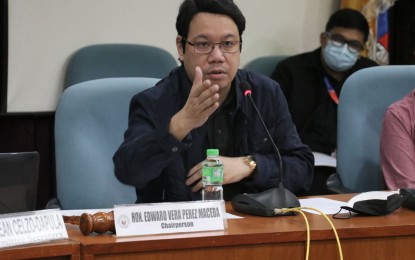
House Committee on Revision of Laws and Manila Rep. Edward Vera Perez Maceda (File photo courtesy of House Press and Public Affairs Bureau)
MANILA – The chairperson of the House Committee on Revision of Laws said revising the procurement law should address the inefficiencies in transparency, lessen delays in the procurement process, and eliminate collusion and political interference.
In sponsoring House Bill 9648 during Monday's plenary session, Manila 4th District Rep. Edward Maceda said there is an imperative to revisit the Government Procurement Reform Act (GPRA) to keep it attuned with the changing and challenging times, particularly in using the latest social and technological advancements.
Maceda noted that amending the government procurement law is one of the priority bills included in the Common Legislative Agenda (CLA) of the 19th Congress.
He said the bill would give high reliability on emerging technologies and innovative solutions by improving the Philippine Government Electronic Procurement System (PhilGEPS) feature, mandating the systems integration between and among key government agencies, as well as using platforms in the information distribution, accessibility of information and public awareness to support digitalization and innovation.
To further transparency, Maceda said the video recording of all procurement-related conferences shall be mandated, as well as the retention of the copies and the storage of such video recording for 12 years.
He said the bill seeks to strengthen the planning stage by applying strategies such as fit-for-purpose policy, detailed engineering, multiyear contracting, early procurement activities, framework agreement, engagement of procuring agent, mandatory market scoping and the use of life cycle assessment and life cycle cost analysis.
He said one of the bill's salient features is the best value procurement, which basically sets the criteria of quality-price ratio in using the most economically advantageous bid (MEAB) for goods and infrastructure projects. Some criteria include qualitative, environmental, social, and/or aspects linked to the subject matter of the procuring entity.
"The heart of this bill, and without this feature, there can be no revision of the procurement law, is the provision giving the Bids and Awards Committee (BAC) or the head of procuring entity (HoPE) the option to use the most economically advantageous bid in evaluating bids for goods and infrastructure projects," he said.
Aside from competitive procurement, other alternative modes of procurement proposed in the measure include direct contracting, limited source bidding, repeat order and negotiation.
The bill, he said, also aims to make the procurement process more efficient by shortening the periods on every stage.
"The previous 90 days, which was also extended in the IRR (implementing rules and regulations)-to a 145-day period of procurement activities, from the opening of the bid up to award, is now shortened to 60 days.
He said the bill also provides a definite period in the administrative disputes and adopts the rule three days-24 hours policy wherein the motion for reconsiderations at any stage shall be filed within three days and the decision or resolution thereof shall be rendered within 24 hours.
"Gone were the days where arbitrary filing of reconsideration and long-time waiting for resolutions or decisions were in place. Coupled with the digitalization of filing, processes and service of pleadings, motion and other legal processes, we hope to finish a dispute in a month," he said. (PNA)
